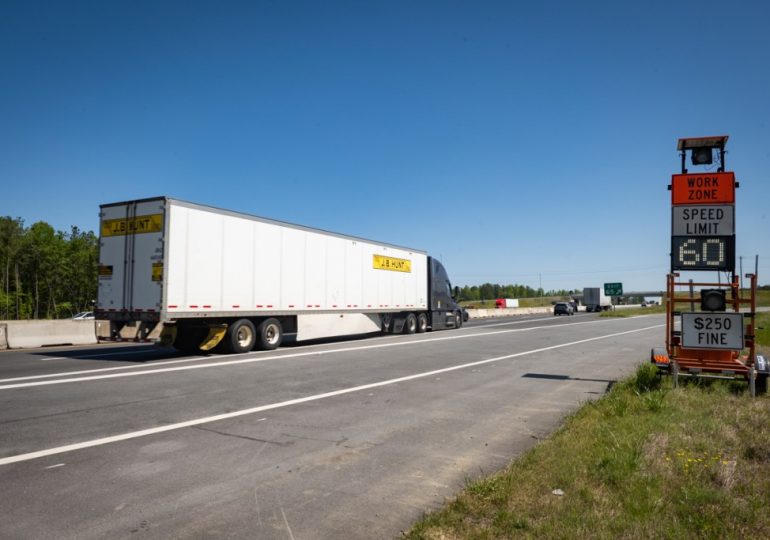To understand the stakes of cleaning up the most-polluting vehicles on our roads, look no further than Charlotte.
The largest city in North Carolina, it’s at the crossroads of two major trucking routes, with 17,000 trips per day spewing smog- and soot-forming pollutants that consistently rank the metro area among the nation’s 100 worst for air quality.
It’s also a burgeoning epicenter for electric vehicle manufacturing and research, home to many of the state’s 40-plus businesses that are already playing a role in the medium- and heavy-duty electric vehicle supply chain.
Clean transportation advocates say the air quality and economy in Charlotte and throughout the state stand to benefit from new Biden administration tailpipe emission rules for heavy-duty trucks, which account for an outsized share of the region’s climate emissions and air pollution.
“The Heavy Duty Rules are a critical step forward in establishing a ‘federal floor’ for clean trucks all across the country,” said Aaron Viles, campaigns director with the Electrification Coalition.
But they also say there’s still a need for other policies to usher in a new generation of electric trucks and buses, including a state-based rule scuttled by the GOP-controlled legislature last year.
Among the leaders?
The transportation sector is the largest source of global warming pollution and the country. Cleaning it up, experts say, means phasing in new electric vehicles of all shapes and sizes, reducing our use of passenger vehicles overall, and powering the grid with renewable energy.
The transition is not without hurdles. Would-be electric vehicle owners and fleet managers worry about a lack of charging infrastructure. And while the costs of electric-powered vehicles are falling steadily and the price of operating them is minimal, potential consumers still balk at their relatively high sticker price.
What’s more, many of the vested interests that revolve around gas and diesel vehicles prefer the status quo, and they extend well beyond the oil industry — including dealers who make money from oil changes and other routine repairs, fueling stations, and manufacturers of engine components.
But climate advocates say overcoming these obstacles has rewards beyond just reducing greenhouse gasses and avoiding catastrophic global warming. In North Carolina, that’s especially true when it comes to cleaning up heavy duty vehicles.
Though trucks, buses and the like make up a tiny fraction of all vehicles on the road, they account for over a quarter of the North Carolina transportation sector’s smog-forming pollutants and nearly a third of its soot-forming emissions, per state officials. Zero-emission vehicles would help curb this pollution.
The transition to heavy-duty electric vehicles could also benefit North Carolina’s economy, with dozens of industries across the state already invested in component production, assembly, or other aspects of the supply chain, according to a 2021 database compiled by the Environmental Defense Fund.
“When you look at where the electric vehicle supply chain investments are going, it’s really clustered in a number of leading states,” said Will Scott, Southeast climate and clean energy director with Environmental Defense Fund. “And North Carolina is among those.”
State v. federal action
Gov. Roy Cooper, a Democrat who is term-limited after this year, had sought first to garner these benefits with the Advanced Clean Truck rule. Initiated with an October 2022 executive order, the measure requires manufacturers to sell increasing numbers of electric trucks, buses, and other large vehicles. California pioneered the standard, and it has been adopted by 10 other states.
But after prodding from the North Carolina Chamber, Republicans who control the General Assembly balked, passing a provision in the state budget to prevent the rule.
“Government mandates and intervention into the market would stifle… innovation and investment,” the Chamber wrote on its website after the budget language prevailed, “as well as increase costs in new trucks, on which nearly all of our members rely.”
The new U.S. Environmental Protection Agency measure, issued this spring, is less ambitious than the California one. But with the Advanced Clean Truck rule essentially dead in the state, advocates say the federal regulation is welcome.
“States that don’t have ACT will now have a federal policy that can support cleaning up our medium- and heavy-duty transportation sectors,” said Stan Cross, transportation director for Southern Alliance for Clean Energy.
In an effort to mollify the industry, Biden officials made their rule “technology neutral,” meaning it would require manufacturers meet a certain tailpipe pollution limit rather than sell a certain percentage of electric vehicles.
The Electrification Coalition says that means the federal rule will result in lower overall electric sales for most classes of vehicles. For instance, the Biden rule is expected to result in as little as 5% of new tractor cab sales bring electric by 2032, depending on class on weight. The California standard, by contrast, requires 40% of all heavy-duty tractor sales to be zero-emitting – and most likely electric, though other technologies qualify.
Still, when it comes to less air and global warming pollution, cleaning up trucks and buses nationwide has an obvious advantage over a patchwork of states doing so. Overall, the Biden administration expects its rule to avoid 1 billion tons of greenhouse gasses.
There’s also value in Biden attacking transportation sector pollution nationally, piece by piece, Cross said. The administration has already promulgated similar rules for passenger cars and trucks, and standards for port equipment, off-road vehicles, and more are still forthcoming.
“They’re doing the math, and they’re thinking about these standards in a comprehensive and holistic way,” said Cross. “They can look at all of our ports, all of our marine traffic, all of our airports, all of our plane traffic, all of our off-road construction — and set standards that will get us where we need to be.”
In a state like North Carolina, home to several major interstates and their truck traffic, cleaning up trucks beyond state borders will also help reduce health-threatening air pollution. An American Lung Association analysis of states with major trucking routes, for example, found that if all heavy-duty vehicle sales were electric by 2040, the state could avoid over 1,700 premature deaths and hundreds of thousands of lost work days.
Those benefits would be crucial for Charlotte, which consistently ranks among the 100 most polluted cities in America for smog-and soot-forming pollution in the Lung Association’s annual State of the Air report.
“Charlotte advocates for clean air, which includes using electric transportation,” Charlotte Mayor Vi Lyles said in a written statement praising the new rules.
And for North Carolina businesses in the medium- and heavy-duty electric vehicle supply chain, the prospect of a national market is clearly better than customers in a smattering of states.
Anything that accelerates the trend toward electric vehicles, Scott said, will come back to the state in the form of jobs and economic activity.
“North Carolina has put itself in a good position to capture a lot of those benefits,” he said.
‘Pole position’
Still, the nationwide rule has a major downside for fleet managers from North Carolina cities and corporations that have commitments to go all-electric. The supply of heavy-duty electric vehicles is still relatively low, and the states who have adopted the Advanced Clean Trucks Rule will get first dibs on it.
The problem could be especially acute in the near term, during which manufacturers can satisfy national requirements just by catering to the 11 states with the more advanced rule.
“ACT puts your state in pole position for the limited amount of zero-emission, trucks and buses that are going to be coming off of assembly lines,” Cross said.
Indeed, that’s part of why advocates supporting the federal standard say they’ll keep looking for opportunities to pass the Advanced Clean Truck Rule in the state.
And though it has little chance of passage, Cooper’s budget this year removes last year’s prohibition on the stronger clean truck standard and includes funding for electric vehicle infrastructure.
“We applaud the governor for taking these steps to end oil’s monopoly on our transportation systems,” said Anne Blair, the Electrification Coalition’s vice president of policy. “But there is still much more that needs to be done to ensure North Carolina and the country are not left behind as the world shifts to electric transportation.”
What would the Biden administration’s new truck rule mean for North Carolina? is an article from Energy News Network, a nonprofit news service covering the clean energy transition. If you would like to support us please make a donation.
Leave a comment




